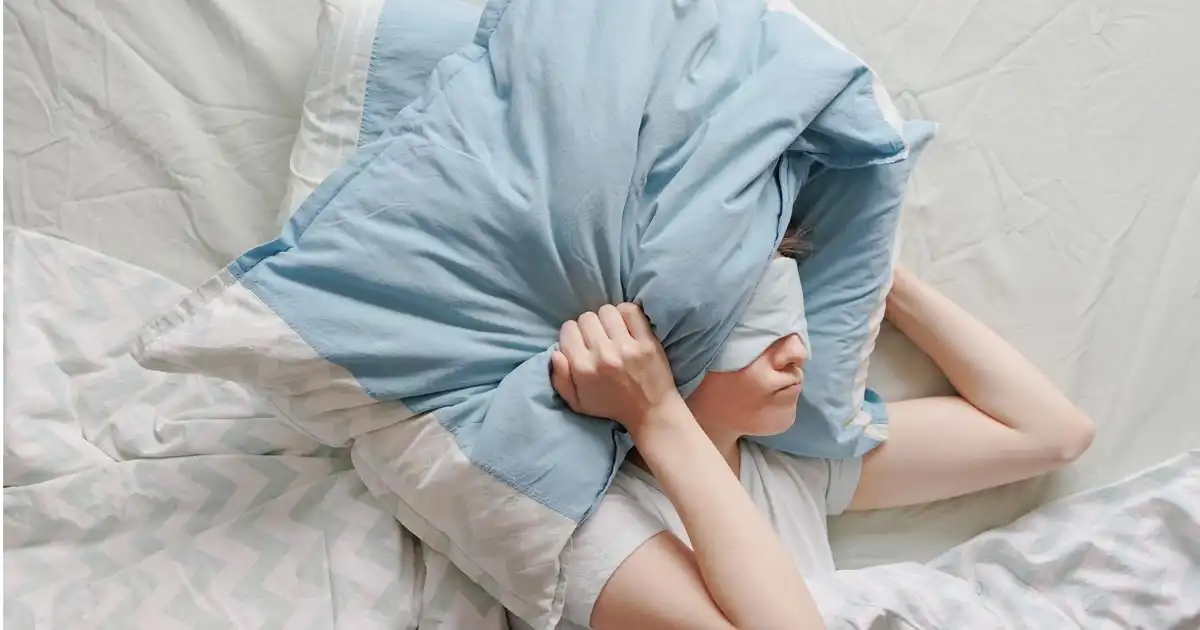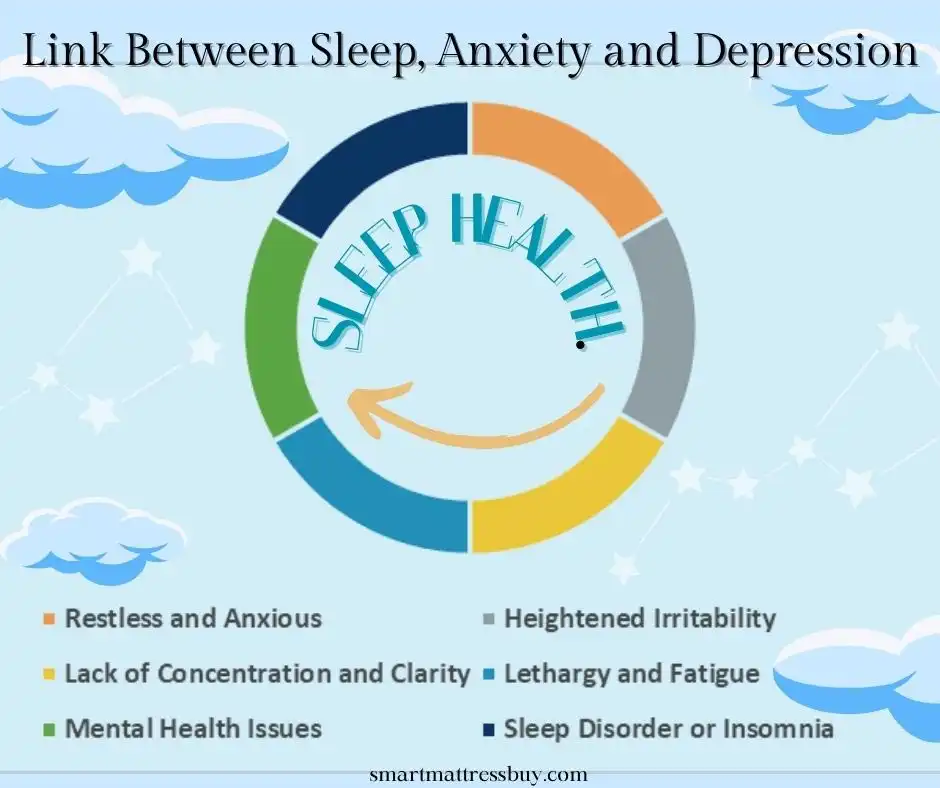What is the Link between Sleep, Anxiety and Depression?

Do you stare vacantly at the ceiling for hours? The things that were of great interest once don’t attract you anymore? There is this constant feeling of unhappiness and lethargy. These are some of the warning signals of depression and anxiety.
Are you feeling lethargic without any physical weakness? Lack of clarity and focus to undertake any mental tasks are the telltale signs of depression related to stress.
Depressive disorders are sporadic bouts of sadness, hopelessness, and feeling empty and shallow for more than two consecutive weeks. When a person feels sad, unhappy, and clueless without concrete reasons, it is evident that something is not right. Do not ignore this mental, emotional, and physical change.
Anxiety is palpitation due to nervousness or overwhelming emotions. Both depression and anxiety directly affect sleep health.
When a person finds it difficult to sleep because of disturbing thoughts, it is quite evident that their brain is not relaxed. Even at night, when the mind needs to relax and the body cries for sleep sleep seems like a distant dream because of anxiety or depression.
Lack of sleep or insomnia is a sleep disorder caused by such bouts of sadness or nervousness. Sleep deprivation causes poor performance at workplace, tiffs in relationships, car accidents, and, in the worst-case scenario, substance abuse.
Bi-directional Relationship: Insomnia and Anxiety & Depression
Sleep disorders and mental health are interlinked like the proverbial chicken and egg – nobody knows which came first. Poor sleep patterns may aggravate mental health issues, and depression or anxiety can lead to lack of sleep. Majority of people with depression face sleep issues. Even a medical practitioner would hesitate to diagnose depression in the absence of sleep problems.
To put it in simpler terms, poor sleep causes mental health issues and vice versa.

Symptoms of Depression and Anxiety
How would you know if a person is suffering from depression and anxiety? Given below are the probable symptoms of such disorders by Center for Disease Control and Prevention (CDC).
- Feeling of restlessness, nervousness, and tension
- Heightened irritability
- Lack of clarity, focus, and memory retention
- Lethargy and fatigue
- Feeling of self-contempt, guilt, or worthlessness
Remember, the above info does not provide a medical diagnosis of depression and anxiety. It doesn’t refer to consulting a medical professional.
Mental health affects people of all gender and ages. A woman may feel worthless and sorry when depressed, while a man is more prone to being angry. A young adult with depression might be more irritable and have trouble communicating with peers and friends, whereas a child with such problems avoids going to school or turns reclusive.
When is the Right Time to Seek Professional Help?
Lack of sleep is caused by issues other than depression and anxiety. However, when you observe that the phase of feeling unhappy, irritated, guilty, or restless is persistent. On top of it, you have trouble sleeping. If all this continues in the same cycle for more than two weeks, then a doctor’s intervention is suggested. A professional medical practitioner can diagnose the exact problem and reason behind such discomfort.
What Are Depression Treatments?
- Improved Sleep Quality
People undergoing treatment for major depression often report a significant improvement in the quality of their sleep. Following a comprehensive assessment with a medical practitioner or mental health professional, a personalized treatment plan is devised based on the type and severity of depression.
- Counseling Options
Depression can be treated through various counseling approaches, including:
- Cognitive Behavioral Therapy (CBT): A proven method for addressing depressive symptoms.
- Interpersonal Therapy (IPT): Focused on improving relationships and communication skills.
- Cognitive Behavioral Therapy for Insomnia (CBT-I): Targeting chronic insomnia to manage sleep-related challenges effectively.
- Medicinal Treatment
Antidepressants are a key component of depression treatment. Consider the following:
These prescription medications may require time to show symptom improvements.
Individuals may need to experiment with different antidepressants and doses to find the most effective fit.
Consultation with a medical professional or psychiatrist is crucial to determine the appropriateness of specific medications.
- Brain Stimulation Therapy
For cases where conventional approaches prove ineffective, explore advanced options under professional guidance:
- Electroconvulsive Therapy (ECT): A well-established treatment for severe depression.
- Repetitive Transcranial Magnetic Stimulation (rTMS): An emerging method showing promise in depression management.
- Vagus Nerve Stimulation (VNS): A therapeutic approach considered in certain cases.
Note: All brain stimulation therapies should be administered exclusively under the expert guidance of trained professionals to ensure safety and efficacy.
These treatments are often used in combination for major efficacy. Most of the time, medication paired with psychotherapy generates an effective result in depression treatment.
Top 6 Tips to Help Sleep Better with Depression
Sleep problems can elevate the risk of developing depression and anxiety. Persistent sleep problems may lead to relapse in successfully treated individuals. Adopting healthy sleep habits enhances sleep quality, uplifts mood, and alleviates challenging depression symptoms.
- Tip 1: Therapeutic Support
Engage in various therapeutic methods, such as:
- Cognitive Behavioral Therapy (CBT)
- Interpersonal Psychotherapy
- Psychodynamic Therapy
Mental health professionals can offer behavioral changes and coping mechanisms to address depression-related sleep challenges.
- Tip 2: Consistent Sleep Schedule
Establish a daily routine by waking up and going to bed at the same time every day. Make sure to get a minimum of seven hours of sleep per night. A nightly routine serves as a cue for the body to reset, facilitating better sleep preparation.
- Tip 3: Careful Napping
Keep daytime naps brief, ideally between 10 and 20 minutes, known as a “power nap.”Power naps regulate emotions, reduce sleepiness, and enhance overall performance.
Naps exceeding 20 minutes may interfere with nighttime sleep, while those under 10 minutes may not provide significant benefits.
- Tip 4: Alcohol Avoidance
Resist the temptation to consume alcohol for relaxation, as it disrupts sleep cycles and reduces REM sleep. Even moderate drinking can impact sleep quality and lead to difficulty falling and staying asleep.
- Tip 5: Outdoor Exposure
Spend time outdoors to align the body’s internal clock and circadian rhythms. Sunlight exposure signals alertness, while evening darkness prompts melatonin production for sleepiness.
Utilize outdoor time to trigger natural brain chemicals that support high-quality sleep.
- Tip 6: Regular Exercise
Engage in light, moderate, or vigorous exercise for improved sleep quality and mental health. Regular exercise reduces depression symptoms effectively – schedule workouts during the first half of the day to avoid potential interference with evening sleep.
FAQs about Sleep, Anxiety, and Depression
Q1. How do you deal with sleep anxiety?
- Avoid caffeine or alcohol before bed. Indulge in meditation or listen to binaural beats for deep sleep.
Q2. How does sleep affect anxiety?
- Lack of sleep aggravates anxiety. It possibly leads to anxiety disorders and depression caused by insomnia.
Q3. What are 2 interesting things about depression?
- The fact that the number of women suffering from depression is higher than that of men raises a concern. But it’s good to know that, mild, moderate, and severe forms of depression are treatable.
Q4. What exactly causes depression?
- Depression is caused either by stressful life events or medical conditions. A person experiencing the death of a loved one, unemployment, bad relationship, divorce, or trauma can have depression. Medical conditions like chronic pain or illness like diabetes, thyroid, etc. cause depression.
References
1. Goulabchand, Radjiv, Elodie Castille, Sophie Navucet, Damien Etchecopar-Etchart, Aurélie Matos, Alexandre Maria, Laure Anne Gutierrez et al. “The interplay between cognition, depression, anxiety, and sleep in primary Sjogren’s Syndrome patients.” Scientific Reports 12, no. 1 (2022): 13176.
Link: https://www.nature.com/articles/s41598-022-17354-1
2. Jindal, Ripu D., and Michael E. Thase. “Treatment of insomnia associated with clinical depression.” Sleep medicine reviews 8, no. 1 (2004): 19-30.
Link: https://www.sciencedirect.com/science/article/abs/pii/S108707920300025X
3. Daut, Rachel A., and Laura K. Fonken. “Circadian regulation of depression: A role for serotonin.” Frontiers in neuroendocrinology 54 (2019): 100746.
Link: https://www.sciencedirect.com/science/article/abs/pii/S009130221930010X
